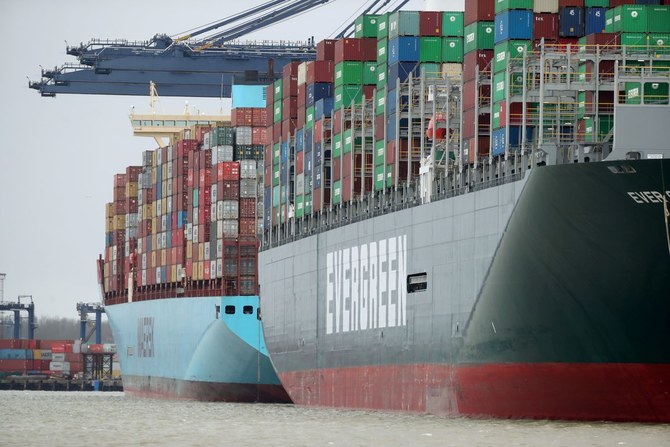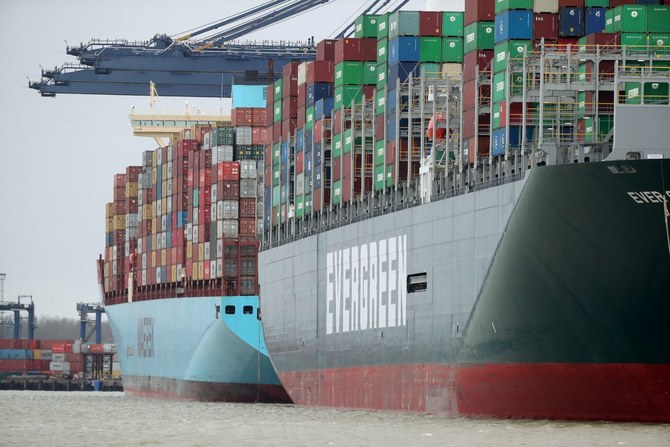LONDON: Britain will set out a plan on Monday to stimulate trade with 70 developing economies, including Pakistan, by lowering tariffs and simplifying rules, its latest push to promote freer global commerce after regaining control of its trade policy following Brexit.
The government will detail the Developing Countries Trading Scheme in a consultation document. The plan builds on an existing European Union scheme that Britain was part of before leaving the bloc at the end of last year and has kept in place while working on its new program.
“Now the UK is an independent trading nation we have a huge opportunity do things differently, taking a more liberal, pro-trade approach that leads to growth and opportunity,” trade minister Liz Truss said.
The scheme seeks to further reduce the bureaucratic burden of trade between Britain and developing countries, as well as countries classed as low or lower-middle income such as Pakistan, Nigeria and Indonesia.
As well as reducing tariffs for goods coming into Britain, the scheme aims to simplify the “rules of origin” that determine where a product with a cross-border supply chain is made for taxation purposes.
Britain said it had studied similar schemes in Canada, the United States, Japan and the EU when drawing up its new program. The government is seeking views on the plan from businesses and other stakeholders over the next eight weeks.
Britain sets out plan to stimulate trade with developing economies, including Pakistan
https://arab.news/w3h3e
Britain sets out plan to stimulate trade with developing economies, including Pakistan

- Scheme seeks to further reduce bureaucratic burden between Britain and countries such as Pakistan, Nigeria and Indonesia
- Plan builds on the existing European Union scheme that Britain was part of before leaving the bloc at the end of last year
Pakistan warns Indian suspension of Indus Waters Treaty could set precedent for China

- New Delhi suspended the river-sharing agreement after a militant attack in Indian-administered Kashmir
- PM Sharif’s aide says Pakistan is discussing the situation with friendly countries and the United Nations
ISLAMABAD: India’s suspension of the Indus Waters Treaty (IWT) could set a precedent for China to block the Brahmaputra River, a senior aide to Prime Minister Shehbaz Sharif warned on Friday, potentially putting New Delhi in a difficult position.
India relies on rivers that originate in China, particularly from the Tibetan Plateau, where major waterways like the Brahmaputra and Sutlej rivers begin.
China’s dam-building activities and lack of a formal water-sharing agreement have raised concerns in India about future water security during floods or droughts. The absence of binding treaties leaves India vulnerable to upstream decisions made by Beijing.
In 2016, China blocked the flow of the Xiabuqu River, which feeds the Brahmaputra, as part of a hydropower project in Tibet after a militant attack in Indian-administered Kashmir.
“If India does something like this that they stop the flow [of rivers] to Pakistan, then China can also do the same thing,” Rana Ihsaan Afzal said while speaking to Geo News. “But if things like this happen then the entire world will be in a war.”
The IWT is a landmark water-sharing agreement signed in 1960 between India and Pakistan, brokered by the World Bank, to manage the use of rivers flowing through both countries from the Himalayas. Under the treaty, India was granted control over the three eastern rivers — Ravi, Beas and Sutlej — while Pakistan received rights over the three western rivers — Indus, Jhelum and Chenab.
Despite multiple wars and ongoing tensions, the treaty has largely held as a rare example of sustained cooperation.
However, India on Wednesday suspended the six-decade-old river-sharing treaty with Pakistan as part of a series of measures following a deadly militant attack in Indian-administered Kashmir, for which it holds Islamabad responsible.
Pakistan has denied any involvement in the attack, in which gunmen killed 26 people at a tourist site in Pahalgam, a scenic town in Anantnag district, marking the deadliest assault on civilians in the country in nearly two decades.
Highlighting that India’s actions threatened the food security of 250 million people, Afzal said under international water laws, upper riparian countries cannot “stop” water but may only “regulate” it.
He added that upper and lower riparian countries coexist peacefully across the world and warned that India’s threat could undermine the entire system of peaceful water-sharing mechanisms, potentially escalating tensions toward conflict.
“This will not be easy at all,” he said. “The United Nations and lower riparian countries throughout the world will raise their voice against it.”
Afzal confirmed that Pakistan was engaging friendly countries through diplomatic channels and was also in contact with the UN.
Pakistan PM hails negative SPI inflation, says economic indicators improving

- SPI focuses on short-term price movements that affect low- and middle-income households most directly
- Shehbaz Sharif says the government wants to pass on the benefits of improving economy to the public
ISLAMABAD: Prime Minister Shehbaz Sharif on Friday expressed satisfaction over the annual decline in Pakistan’s Sensitive Price Index (SPI), which he said had fallen to -3.52% in April 2025, compared to 26.94% in the same month last year.
The SPI measures weekly changes in the prices of essential items such as food, fuel and utilities across various consumption groups. Unlike the broader Consumer Price Index (CPI), which captures overall inflation, the SPI focuses on short-term price movements that affect low- and middle-income households most directly.
“The [SPI] rate stood at 26.94% in the same month last year, whereas in April 2025, it has been recorded at minus 3.52%,” the prime minister said in a statement issued by his office.
“The country’s economic indicators are improving with each passing day,” he added. “The government is making every effort to ensure that the benefits of these improving economic indicators reach the public.”
Sharif also commended his economic team for their efforts in stabilizing the economy and curbing inflation.
In May 2023, Pakistan experienced its highest recorded inflation, with the CPI reaching 38% year-on-year, driven by surging food and energy prices.
The recent decline in the SPI indicates potential relief for consumers, though the government continues to face challenges in managing the economy, including meeting fiscal targets and securing external financing.
VISA to triple Pakistan office size, partner with 1-Link, PayPak — finance minister

- Muhammad Aurangzeb hails company’s role in advancing digital payments and financial inclusion
- The finance minister also assures the US financial services company of the government’s full support
ISLAMABAD: Finance Minister Muhammad Aurangzeb said on Thursday US financial services company Visa will triple the size of its office in Pakistan and collaborate with the country’s first-ever domestic payment card scheme, 1Link and PayPak.
Visa Inc. is a global payments technology company that operates one of the world’s largest electronic payment networks, enabling consumers and businesses to make payments using Visa-branded credit, debit and prepaid cards.
Visa doesn’t issue cards itself but partners with banks and financial institutions to do so. 1Link and PayPak is similar in concept to Visa or Mastercard but is designed specifically for local use within Pakistan.
The Pakistani minister, currently in Washington, appreciated Visa’s role in the digitalization of his country’s economy during a meeting with the company’s regional vice president, Andrew Torre.
“He [Aurangzeb] noted that Visa’s decision to triple the size of its office in Pakistan and its collaboration with 1Link and PayPak would contribute significantly to promoting financial inclusion, e-commerce, transaction security, and payment gateways in Pakistan, as well as facilitate remittances,” the finance ministry said in a statement issued after the meeting.
It added the finance minister also assured the company of the government’s full support in resolving any issues faced by them.
Aurangzeb’s meeting with Torre came as the country works toward a more inclusive and digitally empowered economy, with government backing and private sector innovation aligned.
Pakistan Senate rejects Indian attempt to link it to Kashmir tourist attack

- Deputy PM Ishaq Dar says India must be held accountable for its acts of ‘terrorism’ in Pakistan
- He also reaffirms Pakistan’s ‘moral, political and diplomatic’ support to the people of Kashmir
ISLAMABAD: Pakistan’s Senate on Friday unanimously passed a resolution condemning what it called India’s “frivolous and baseless” attempts to link Islamabad to a deadly shooting in the disputed Himalayan region of Kashmir, rejecting the allegation and accusing New Delhi of using “terrorism” as a political tool.
India has blamed Pakistan for the attack in the scenic town of Pahalgam in Kashmir’s Anantnag district, where gunmen killed 26 civilians on Tuesday in the deadliest assault on non-combatants in nearly two decades.
Pakistan has denied any involvement in the incident, with Deputy Prime Minister Ishaq Dar reading out the resolution in the upper house of parliament that was later adopted by all the lawmakers.
“The Senate of Pakistan condemns terrorism in all its forms and manifestation, emphasizes that killing of innocent civilians is contrary to the values upheld by Pakistan [and] rejects all frivolous and baseless attempts to link Pakistan with the Pahalgam attack of 22nd April 2025 in Indian Illegally Occupied Jammu and Kashmir,” he said.
The resolution denounced India’s suspension of the decades-old Indus Waters Treaty and reaffirmed Pakistan’s support for the Kashmiri people’s right to self-determination.
It also accused India of waging a “mala fide campaign” to malign Pakistan.
“The country’s sovereignty, security and interests demand that India should be held accountable for its involvement in different acts of terrorism and targeted assassinations on the soil of other countries, including Pakistan,” Dar continued.
He also reaffirmed Pakistan’s “unwavering moral, political and diplomatic support for and commitment to the Kashmiri people’s just struggle for realization of their inalienable right to self determination.”
Detained Pakistan rights activist Dr. Mahrang Baloch launches hunger strike

- Baloch, 32, was arrested last month on charges of terrorism, sedition and murder
- Dozen UN experts called on Pakistan in March to immediately release Baloch rights defenders
QUETTA: Detained activist Dr. Mahrang Baloch, one of the leading campaigners for Pakistan’s Baloch minority, has launched a hunger strike along with other detainees, her sister told AFP on Friday.
Mahrang Baloch, 32, was arrested last month on charges of terrorism, sedition and murder.
In her native Balochistan, an impoverished province that borders Afghanistan and Iran, security forces are battling a growing insurgency.
Rights groups say the violence has been countered with a severe crackdown that has swept up innocent people. Authorities deny heavyhandedness.
Mahrang’s hunger strike “is aimed at denouncing the misconduct of the police and the failure of the justice system to protect... prisoners,” her younger sister, Nadia Baloch, said.
Nadia said the hunger strike was launched on Thursday after the attempted “abduction” of one of the Baloch detainees.
Mahrang’s organization, the Baloch Yakjehti Committee (BYC), said the inmate was beaten by security officials and taken from the prison to an unknown location.
A security official said the detainee was moved to another prison and denied any mistreatment.
BYC said four other detained Baloch activists have joined the hunger strike.
“All of them are peaceful political workers, imprisoned for raising their voices... Their only ‘crime’ is organizing peacefully in an environment saturated with state terror and violence,” the group said.
Activists say in the crackdown against militancy in the region authorities have harassed and carried out extrajudicial killings of Baloch civilians.
Pakistani authorities reject the “baseless allegations.”
A dozen UN experts called on Pakistan in March to immediately release Baloch rights defenders, including Mahrang, and to end the repression of their peaceful protests.
UN special rapporteur for human rights defenders Mary Lawlor said she was “disturbed by reports of further mistreatment in prison.”
The judiciary has declined to rule on Mahrang’s detention, effectively halting any appeal and placing the matter solely in the hands of the provincial government.
Insurgents in Balochistan accuse outsiders of plundering the province’s rich natural resources and launched a dramatic train siege in March, during which officials said about 60 people were killed.












